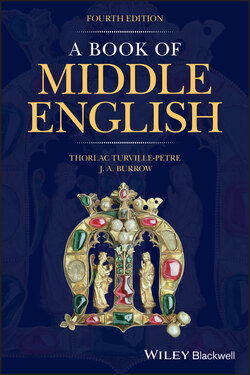Читать книгу A Book of Middle English - J. A. Burrow - Страница 80
5.8 Questions
ОглавлениеIn direct questions the subject follows the verb, whether or not an interrogative word such as ‘why’ or ‘what’ is used: how schal I do?, 6/102; can thow serven?, 7a/12; whi seist þou so?, 14j/25. The modern use of do as an auxiliary in questions is unusual even at the end of the period; compare quotation with translation here: wenst þu þat ich ne cunne singe?, ‘do you think that I can’t sing?’, 2/47.
As in Modern English, the ‘declarative question’, in which the word‐order is that of a statement, is also possible. Here the context, and in this particular case the addition of the adverbial clause, make it clear that this is a question: thow art broke, so may be?, ‘you are injured, maybe?’, 7a/33.
A negative question has verb–subject word‐order with ne before the verb: why ne dyʒttez þou me to diʒe?, ‘why don’t you condemn me to die?’, 8/488; nas I a paynym?, ‘was I not a pagan?’, 11/285.
The word whether may be used to introduce a question, especially if there is doubt between two alternatives: wheþer ys ʒow levere have …, ‘would you rather have’ (where the choice is between rhyme or prose), 12/145.
